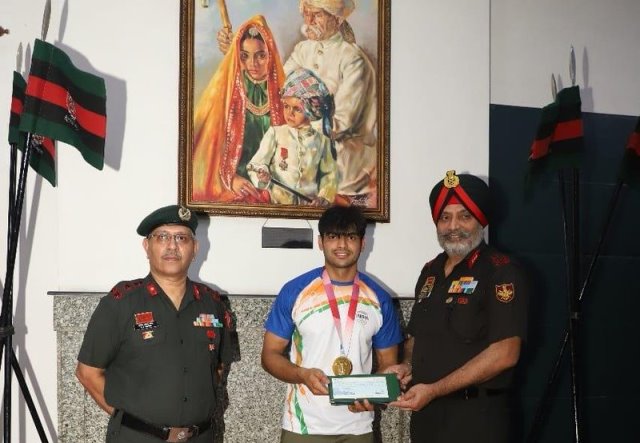Indian Armed Forces have been in the forefront of selecting and training sportsmen of international repute right from the time of independence in 1947. Dhyan Chand, the hockey wizard who helped India win three gold medal in Olympics, the Flying Sikh Milkha Singh, Rajyavardhan Rathore, the shooter who got the first individual Silver medal in Olympics and Neeraj Chopra, the golden boy of Tokyo Olympics, are all from the Indian Army.
The boxers, shooters, wrestlers and rowers from the Army continue to give a good account of themselves and were quite close to getting medals for the country. At least three to four players from the Army including Balbir Singh (Junior) were always part of the Indian hockey team.
The Army gives tremendous opportunities to the budding sportsmen to rise, shine and zoom. The sports culture, sports infrastructure and facilities, strict regimen and discipline gives these aspiring sportsmen a head start over other competing athletes from the civil street. Having sports competitions from grass root levels of inter-company, squadron or battery.
It was Gen S Padmanabhan, the then Chief of Army Staff (COAS ) in 2001 who revived the old tradition of having boys companies for sports in various disciplines. He also started Mission Olympics to prepare sportsmen for representing the country in Olympics. As on today, the Army has 26 boys sports companies in 21 disciplines. These sports companies are affiliated to regimental centres whose troops excel in these disciplines. For example, the Rajputana Regimental (RAJRIF) Centre in Delhi had boys companies in Athletics, Basketball and Volleyball. During the rationalisation, the Athletics Boys company has gone to another regiment whose training centre is located at Faizabad.

Incidentally, Neeraj Chopra is from 4 RAJRIF, a Battalion with a great fighting legacy; it was awarded two Victoria Crosses (equivalent to Param Vir Chakra) and 167 other decorations during World War II. Based on its performance over the years, the unit went on a United Nations Peacekeeping Mission to Congo from 1960 to 1962. Today there are three serving and three recently retired generals from the battalion; a rare honour for any unit of the Indian Army.
The boys companies pick up promising young boys of 08 to to 14 years of age, who have attained certain levels of expertise in a particular sport for having played at district or state level. These boys are given education in a good day scholar school located close to their military hostel. The Army gives the boys free boarding and lodging as also train them to join the regular army after attaining the age of 18. The boys who show adequate talent to go higher are then sent to Army Sports Institute (ASI) Pune, where scientific coaching and diets are given to these boys and they are prepared for taking part in the Nationals and Olympics.
The ASI was also raised in 2001 and till date has produced 52 olympians. The outstanding sportsmen who qualify for nationals are then picked up by Sports Authority of India (SAI) who prepares these sportsmen for international events like Commonwealth and Asian Games and World U20 Athletics.
ALSO READ: Indian Army Is People’s Fauj
Gen JJ Singh, the then COAS in 2006 introduced additional disciplines like Shooting and Golf wherein promising sports persons including the wards of servicemen were picked up at an early age and trained for Olympics in a systematic manner. Mission Olympics Wing (MOW) in the Directorate General of Military Training (DGMT) was given the overall responsibility to oversee the training of the Olympics probables. The boys companies and the ASI operate under the close scrutiny of the DGMT who also works closely with SAI and Khelo India organisation. To make it more lucrative for the promising sports persons, the Army gives the direct rank of Naib Subedar, a Junior Commissioned Officer on their joining the Army. These selected sportsmen are then prepared for Olympics by giving them training abroad under foreign coaches with the help of SAI.
The selection system of the Indian Army in various sports disciplines is very transparent and fair. Once the sportsman is selected, concerted efforts are put in to ensure that he gets international exposure and coaching in the correct environs. The levels of motivation, dedication and killer instinct inculcated in the sportsmen in the Army stands them in good stead when they compete with the best in the world. In times to come, the Army will surely raise Girls Companies in the major sports as our women athletes have shown more resolve and resilience in Tokyo Olympics and the Army is also getting girls into Sainik Schools, National Defence Academy and other institutions and the intake of officers and ranks is going to enhance for women in the Army. The ethos and elan of the Army instills in every soldier to give their last ounce of blood and sweat for the country and sportsmen are no exception!

In Tokyo Olympics, the Army sent 16 probable from various disciplines. Neeraj Chopra got the gold medal, Deepak Punia in wrestling and Satish in boxing narrowly missed medals. The men’s 4x400m relay race team gave an excellent account of themselves by setting a new Asian record; with athletes from the Indian Army. The two rowers Arjun Lal and Arvind Singh got 11th position in the double skull event, the best that any Indians had done so far.
Most of these participants are in their early 20s and with their experience in Tokyo Olympics; they are likely to get greater number of medals for the country at Paris in 2024. We have only three years to prepare and ensure that these promising athletes peak at the time of Olympics just like Neeraj Chopra who was head and shoulders ahead of all other contestants in javelin throw. The country should also follow the model of the Armed Forces to ensure that the very best are sent to the Olympics and they do their nation proud by earning medals somewhat commensurate to our population.
